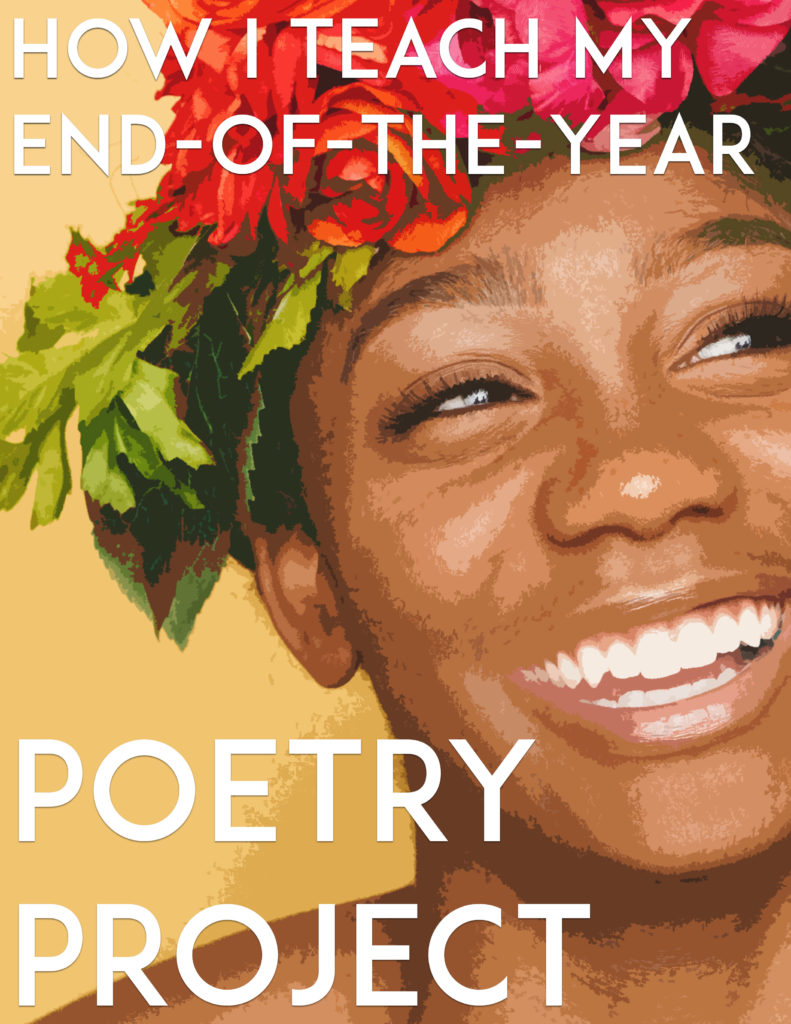How I Teach My End-of-the-Year Poetry Project

The last few days before summer vacation can be a slow painful countdown—or they can be an opportunity to try something new, get students working independently, and give teachers a break. It’s not that teachers are sick of their students (okay, maybe just a little bit) it’s that we’re all ready for something a little bit different. For me, that sometimes means finishing off the term with an engaging poetry unit. My End Of The Year Poetry Unit is a fun way to get students working independently through challenging, accessible, and relevant poems; to get them experimenting with writing their own poetry; and to get them reading and exploring poets of their choosing.
This is how I get students to work independently and sharpen their poetry reading and writing skills at the end of the year.
I start with a some class time on the elements of poetry. Sometimes classes need no more than a quick review, while sometimes they need new ways to process and understand the information. Depending on how much time we’ve spent on the poetic devices, I might just go over the terms, or I might spend some time on review games or lessons.
Students then work through 11 modern poems in groups or on their own. The questions that I have written for these poems are great for students to work at their own pace, independently or with others. I’m not really one for lectures or slideshows, and by the end of the year, I am tired of standing in front of the room for any reason. By giving students close reading questions, I can move around the room, checking in with students on a one-to-one basis, and getting a better sense of where they are. What I also love about the poems in this unit is that they were all written in the last 30 years or so.
Then, classes get to try their hand at writing some poetry of their own. At the end of every class, or maybe whenever I sense we need to change things up, I bring the class back together to try a specific poetry writing exercise. When I couch poetry writing as fun games, students learn that exploring language and experimenting with words is something they love, and they also explore the elements of poetry from the inside out.
I keep moving around the room, engaging students in mini discussions and pushing them to go deeper with the poems. Maybe students are getting tripped up with a question on personification, or maybe a group in the corner has found a really interesting or unique idea for a theme statement for the poem they just finished reading. Perhaps a student has found two examples of figurative language in the first stanza but is still struggling to explain how they create meaning in the poem. This is my chance to make sure that students are sufficiently challenged and to connect a little with them in a different way.
When they have finished working through the poems, I present the final project: Students have a few days to read and explore a poet of their choosing. After working through the eleven poems in the unit, students are tasked with choosing one poet from that list—or if they are more ambitious choosing one on their own—reading some poems from that writer, and then creating a mini anthology of what they have found. They will do a little more analysis, a little more writing, and a little more thinking—but this time, it’s even more independent. Of course, this all seems like a fun project for my students, but I still want to maintain rigor and my standards through the end of the year, so I have rubrics for grading their work.
Students create their own anthology and present it to the class. We spend a few days listening to each other’s choices and hearing even more great poetry. One of the final steps of the anthology project is for students to present one poem of their choosing to their classmates. Any teacher who has witnessed one student recommend a book or story to another student knows the joy of standing back and watching a love for reading spread.
In the end, I’ll still have a stack of work to grade, but when I do, it will be like attending a poetry reading with each and every one of my students. They’ll have written informally about pieces that they have found and enjoyed. I might get a few ideas for poems to use with next years’ classes, and I’ll get a chance to see what students have really learned about how to read, analyze, and write about literature. Seeing how far they’ve come by the end of the year is always a great way to close off the term.
